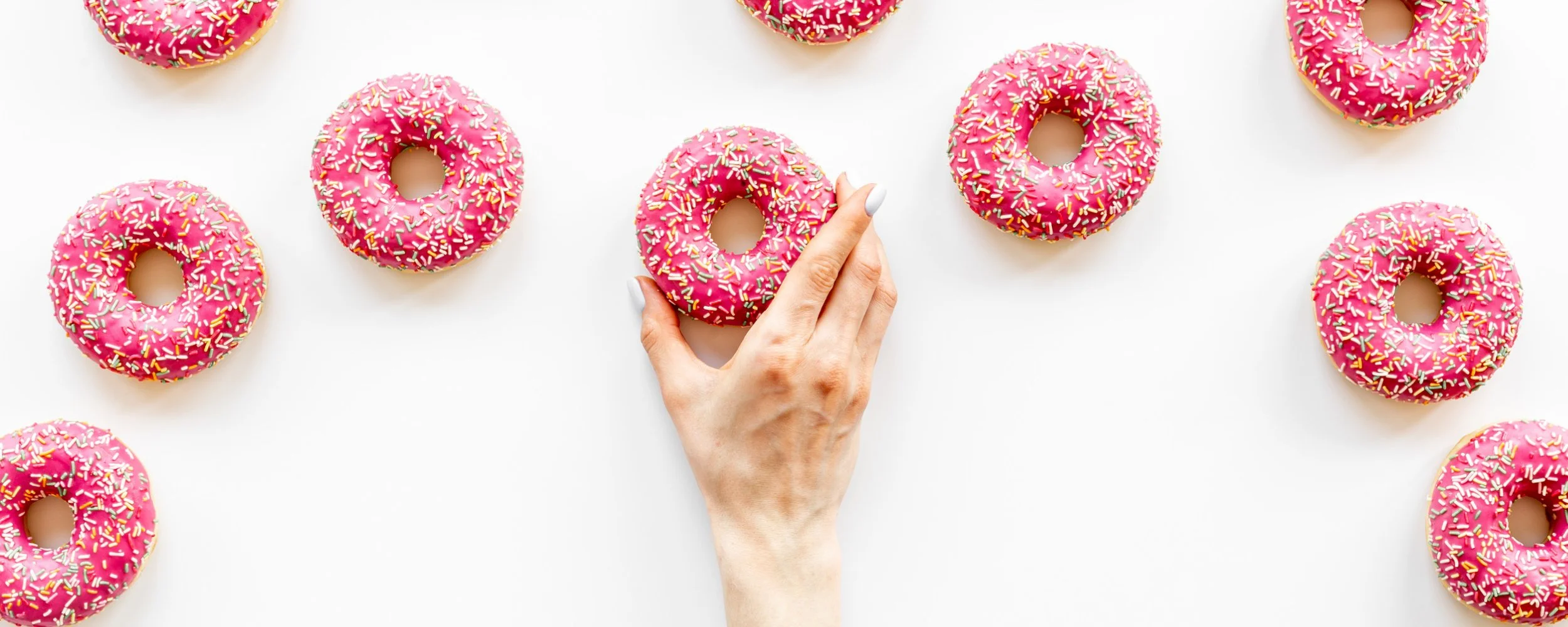How Sugar Affects Your Body (and What You Can Do About It)
🕒 8-9 min read
Pressed for time? Here’s the short and sweet scoop:
Understanding sugar’s effects can help you with more energy, improved digestion, balanced mood, and fewer cravings.
Start tracking how your body responds to sugar with a simple journal to uncover patterns and triggers.
Want tools to better manage your blood sugar? Check out my blog: 4 Tools for Blood Sugar Balance.
If you’re ready to take charge of your sugar cravings and build habits that support your energy, mood, and digestion, this blog is for you.
📌 Keep reading - or save this post for when you’re ready to feel more in control of your sugar intake.
Picture this.
You’re in the middle of your day and suddenly your mind is fixated on the chocolate in your cupboard (or the office break room). You’re not even hungry, but there you are.
Thinking about chocolate.
You try to put it out of your mind, but somehow 5 minutes later…
Still thinking about chocolate.
So you tell yourself you’ll just have a little. You give in and grab a piece and soon find yourself going back for more, and a little more, and then you start craving pasta, and…ooh maybe some ice cream.
It’s no surprise if this feels familiar. Your brain is wired for sweetness. Something that once meant safety and quick energy is now telling your brain not to resist that hard-to-come-by energy, even though it’s really easy to come by. As a holistic nutritionist and gut health expert, I’ve seen this pattern in many clients over the years, and understanding why sugar feels so irresistible is the first step to feeling more in control of your relationship with it.
Why You’re Wired to Love Sugar
Sugar hasn’t always been everywhere the way it is now. For most of human history, sweet foods were rare and precious…a taste of honey from a hive or a piece of ripe fruit found as you hunted and gathered. Sweetness meant quick energy and, most importantly, safety. Bitter plants could be poisonous, but sweet flavors signaled nourishment and survival.
The human brain learned to celebrate those moments, connecting sugar to reward and saying, Yes, more of this please!
That ancient wiring is still alive in you today, even though sugar is anything but scarce. Each bite of something sweet triggers the same reward center in your brain, releasing dopamine that encourages you to keep going back for more. It’s the very same part of your brain influenced by addictive substances, which is why sugar can feel so hard to resist.
On top of that, sugar creates its own feedback loop in your body: a quick burst of energy, followed by a crash that convinces your body it’s low on fuel and needs more. Before you know it, you’re stuck in a cycle of trying to stop eating sugar but your cravings just won’t quit.
Instead of expecting sheer willpower to contain your cravings, being aware of what happens when sugar becomes a daily habit can be a powerful motivator to find strategies that help you reduce your intake.
The draw of sugar is real, especially when it’s right in front of you. Learning a few key tools makes it easier to break the cycle and build confidence in your decisions.
The Hidden Effects of Sugar on Your Body
Understanding why sugar feels so irresistible is only part of the story. A high intake creates a chain reaction in your body. Here are some of the biggest ways excess sugar can interfere with your health:
Nutrient depletion - Processed sugar contains no vitamins or minerals, and your body actually uses its own nutrient stores to process it. It can even compete with vitamin C for entry into your cells, leaving your immune system with less support.
Compromised skin - Sugar triggers glycation, a process that weakens collagen and elastin, leading to more wrinkles and less skin elasticity.
Insulin resistance and diabetes risk - Consistently high sugar intake can eventually reduce the signaling between insulin and your cells, leading to insulin resistance, a major risk factor for Type 2 diabetes.
Inflammation and chronic disease - From nutrient depletion to blood sugar imbalances, excess sugar fuels inflammation throughout your body, increasing risk of many chronic health conditions.
Energy crashes - Sugar causes blood sugar spikes and dips that leave you drained and reaching for another quick fix.
Altered brain function - Insulin, the hormone that regulates blood sugar, also supports cognitive function, so high sugar intake and insulin resistance can impair learning and memory over time.
Mood shifts - That same blood sugar rollercoaster that drains energy also fuels anxiety and mood swings. Chronically high sugar intake can also lower serotonin, one of your feel-good neurotransmitters.
Compromised digestion - Because serotonin also supports digestion, lower levels don’t just affect mood, they can slow gut motility and contribute to discomfort or irregularity. Excess sugar can also promote intestinal inflammation and leaky gut, leading to bloating, gas, abdominal pain, and irregular bowel habits.
Knowing the hidden effects of sugar can be eye-opening. However, the real shift comes when you start experimenting with small, practical changes that help you feel more balanced and in control.
Energy highs from sugar never last. The crash that follows can leave you drained, unfocused, and reaching for the next quick fix.
Want to feel more in control of your blood sugar? Check out my blog: 4 Tools for Blood Sugar Balance.
Steps to Regain Balance with Sugar
Sugar doesn’t have to be your enemy. It has its place in celebration and culture. The goal is to enjoy your favorite sweets occasionally, without letting them run the show. Here are some simple, doable ways to get started:
1. Start with labels
Check the “Added Sugars” line on any Nutrition Facts label. This is more accurate than total sugars, since it separates natural sugars (like those in fruit or dairy) from added processed sugars.
2. Learn the sneaky names
Sugar has more than 70 different names you’ll find on ingredient lists. Look for words like syrup, nectar, crystals, sweetener, malt, or anything ending in -ose. Spotting these makes it easier to see where sugar is hiding.
3. Track without judgment
Keep a food and observation journal or make a few notes on your phone about how much sugar you’re consuming. This isn’t about restrictions or rules…it’s about curiosity. Awareness opens the door to small, sustainable changes and exploration helps you find what works best.
Journaling how you feel with your food choices invites awareness without pressure. That simple reflection can shift sugar from an automatic habit to a mindful choice, opening space for small changes that truly support your body.
4. Find your triggers
When a craving hits, pause and ask, “Why do I want sugar right now?” It might be fatigue, stress, boredom, or habit. Once you know your trigger, you can try other strategies, like a protein-rich snack for energy or a quick walk to reduce stress.
Want to uncover what drives your sugar cravings? Download your FREE 7-Day Food & Symptom Journal and start noticing how your body responds to what you eat.
5. Allow room for celebration
Sugar is tied to culture, family, and joy. Sharing dessert at a birthday or having a treat with friends can absolutely fit into a balanced lifestyle. The key is keeping your everyday choices aligned with your health goals, so your sweet treats feel intentional instead of impulsive.
Final Thoughts: A Process Worth Committing To
Sugar is deeply woven into culture, memories, and daily routines, which is why it can feel so hard to resist. I never expect my clients to quit cold turkey or believe reducing sugar is quick and easy. Allowing it to take up less space in your life is a process, but one worth committing to. Stay curious about how it shows up for you. With time, your energy, mood, digestion, and overall health can improve…and each step toward what feels good becomes easier.
And yes, you can still savor life’s sweetest moments along the way.
Love more tips to help you feel better in your body? Get them delivered straight to your inbox with The Mindful Digest.
RESOURCES
Max Planck Institute for Metabolism Research. How does sugar influence our brain? Published 2024. Accessed November 13, 2024. https://www.sf.mpg.de/2078394/How-does-sugar-influence-our-brain
© Stephanie Walsh and Walsh Approach, 2025. I pour a lot of care into creating this content, so please don’t copy or reuse it without permission. You’re always welcome to share excerpts or links if you give clear credit back to Stephanie Walsh and Walsh Approach.





